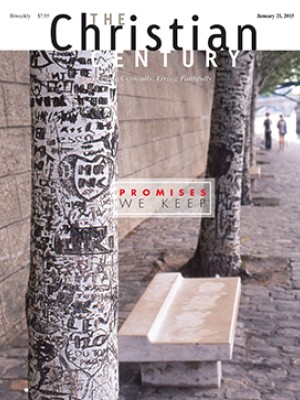Sunday, January 25, 2015: 1 Corinthians 7:29-31
Paul isn’t asking us to avoid the world. But if the form of the world is passing away, the everyday is becoming a step into promise.
I often wonder what the Saturday after Jesus’ crucifixion was like for the disciples. For years they had come to know him—to work and sleep alongside him, eat and pray with him, travel with him in and out of so many people’s lives. They walked in wonder and confusion each day, believing a new world was being ushered into existence. And then it wasn’t. They woke up Saturday morning without him to greet them. They ate their first meal not hearing his voice blessing their fish and bread. Mourning soaked their steps that day, each mundane act crying out what was not and what would not be.
Paul’s exhortation for “those who mourn” to live “as though they were not mourning” seems cruel, even delusional. I lost both my parents to cancer, my father when I was 17 and my mother when I was 25. Those empty days after their bodies had been rolled away still pit my stomach; they remain deep crevasses I peer into, knowing that if I enter, I won’t return without darkness, pain, and struggle. Surely Paul is not asking me to pretend that there is no gap? No absence in the day or in the days to come?
Read our latest issue or browse back issues.
This 1 Corinthians passage shows how even the ordinary is made new because of Christ. To buy as though they have no possessions, for those who have wives to be as though they have none, to deal with the world as though they have no dealings—these everyday practices are not to be resisted. Paul is not asking us to avoid the world. But if the form of the world is passing away, the mundane, too, is undergoing a metamorphosis. The everyday is becoming not a mark of absence but a step into promise.
The days following my mother’s death were punctuated with loss, with absence. Each meal was one more meal I would not share. Then I was reminded of Jesus’ visit to Jairus’s daughter. “She is only sleeping,” Jesus says. In the gap between when Jairus sends for Jesus and his daughter’s seemingly last breath, Jairus must think it’s too late. All he can see is loss. But Jesus’ arrival means that this breath was not her last, that Jairus’s mourning is not the finality he imagined. His daughter will wake, and he will hold the child he thought was dead, now returned to him.
To say my mother and my father are only sleeping is not to forget their absence. It is to orient my living and my eating toward their return, to a rejoining of their body and soul—to our familial communion.
“The present form of this world is passing away,” says Paul. These words lead us not away from the significance of the everyday but into a deeper experience of the transformation that lies at its center. Mary’s preparations that Saturday evening are oriented toward comforting the absence the tomb represents. The empty tomb that awaits her transforms these preparations into activities of expectation—flowers of memorial to signs of life inhabiting the world, now and forever.
What happens when the church buys not to possess, but to give? When we deal with the world not in its machinations of power, violence, and greed but as though every body were seen and embraced and desired by God? When we act as though such dealings take us into spaces of unrelenting commitment to one another’s flourishing, rather than a devotion to the lies of self-sufficiency?
To say, “Christ has died. Christ is risen!” is to imagine our daily lives animated by a purpose and possibility undulating beneath the surface. This makes our individual lives icons of the in-breaking of God into our midst, bringing the end and beginning to a bursting present. Mary prepares flowers for her son. She prepares to attend to the grave of a son plucked from the world not by a crazed individual or by his own misguided criminal life. He is an innocent man who provoked through his faithfulness, who dared to live a life that asked questions of the world’s authorities. Mary visits the grave of a man whose life was robbed from her, who was murdered at the hands of the state.
To recognize this is to see our individual mourning or buying or marrying or dealing with the world as more than individual moments. Our lives are tied to a larger system that is itself wrestling with the reality of God’s presence in the world, with God’s desire for creation to be whole and loved and loving and just. We are tied together in Christ, our lives and everyday moments all flowing with—or against—God’s reconciling work.
In recent months our society has seen a collective in-breaking of people filling the streets. “To those whose lives are said not to matter,” they say, “live as though #blacklivesmatter,” as though our black bodies have profound dignity. These bodies are rendered invisible in the media, systematically branded by the criminal justice system, killed with impunity, rendered silent in our schools. But we write and chant and march to testify that although such lies are made incarnate, our God entered into a life of marginalization, disrepute, and state-sponsored violence—allowing his hands and feet to be branded with marks of criminality.
This God was not in the tomb that Sunday morning. Christ has made our words into song and our steps into quakes of justice. What has been called low will be called high. We will mourn as those who do not mourn. We will march as though justice lies beneath our feet—waiting only for the tremble of our collective voices to crack the veneer of society’s passive violence against the seemingly invisible.







